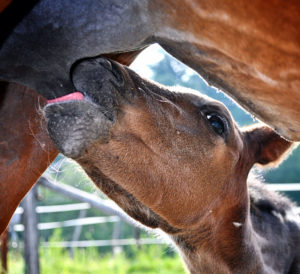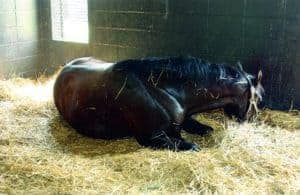
The Healthy Newborn Foal: Why is Passive Transfer Important?
Infection can cause serious illness in neonates. Make sure your newborn receives enough disease-fighting antibodies from his dam’s first milk.

Infection can cause serious illness in neonates. Make sure your newborn receives enough disease-fighting antibodies from his dam’s first milk.

What could cause an older horse that’s not eating well to have mucous-covered manure?

This equine herpesvirus outbreak serves as an excellent reminder of the importance of good biosecurity practices.
Could my horse’s drool be because of an allergy or behavioral problem?
New developments in vaccines and current literature on equine immunizations were the focus of discussion at the vaccination Table Topic during the 2010 American Association of Equine Practitioners Convention, held Dec. 4-8 in Baltimore, Md. The attending practitioners actively participated in the discussion with questions and comments on immunizations for various diseases. All agreed that

Recurrent colic is typically defined as three or more episodes of transient or prolonged colic occurring over a period of months or upwards of a year.
Recurrent colic is typically defined as three or more episodes of transient or prolonged colic occurring over a period of months or upwards of a year. Although a practitioner cannot always determine a definitive etiology without exploratory surgery, many diagnostics are available to help pinpoint the most likely cause of recurrent colic.
Q: Can you address off-label use of the rabies vaccine in late-term broodmares? My therio vet won’t give it because it’s off-label usage. So I arrange for another vet in her practice to vaccinate my late-term mares. I cannot imagine my foals not having that protection from his or her first moments.
A: Rabies vaccination can be administered in the last trimester of pregnancy prior to delivery

Rabies is a life-threatening neurological disease that can be spread from horses to humans. Once horses show clinical signs of rabies, death generally occurs in two to four days. Learn how to protect your horse and yourself.
This is one of a series of articles translated as part of our partnership with A Caballo, an equine publication based in Mexico, and Jorge
Strangles is a dreaded disease for horse owners. It is caused by bacterial infection with Streptococcus equi subspecies equi (referred to as S. equi). The bacteria typically infect the upper airway and lymph nodes of the head and neck. Strangles has affected horses for centuries, is highly contagious, can recur on farms with previous outbreaks, and is one of the most commonl
Septicemia can manifest as pneumonia, diarrhea, meningitis (inflammation of the membranes of the brain and spinal cord), and joint and/or umbilical infections in the foal.
Stay on top of the most recent Horse Health news with
© 2022 Copyright Statement dolor sit amet, consetetur sadipscing User Terms, sed diam nonumy eirmod tempor invidunt ut labore et dolore magna aliquyam erat, sed diam voluptua. At vero eos et accusam et justo duo dolores et ea rebum. Stet clita kasd gubergren, no sea takimata sanctus est Lorem ipsum dolor sit amet.